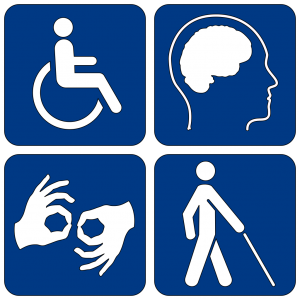Widgetized Section
Go to Admin » Appearance » Widgets » and move Gabfire Widget: Social into that MastheadOverlay zone
Non-Profits and Policy Change
The views expressed are those of the author and do not necessarily reflect the views of ASPA as an organization.
By Katie Leigh Robinson
August 2, 2020

Non-profit organizations have long filled in the gaps when it comes to services that the United States government is not able to provide. The types of services provided, types of organizations and motivations vary widely; from religious organizations to organizations that provide medical services to marginalized communities to organizations that provide backpacks and school supplies to students in Title I schools.
One thing that most non-profit organizations do have in common is that most have affected policy change—either purposefully or by accident. In his book Politics of Empowerment, David Pettinicchio details the history of disability policy and delves into how advocacy groups influenced and kickstarted the federal policy process in the United States. Organizations like Disabled in Action, the American Coalition of Citizens with Disabilities, and Americans Disabled for Accessible Public Transit (ADAPT) have historically been influential in changing unofficial and official policies at the local, state and federal levels while activists such as Judith Heumann, Justin Whitlock Dart, Jr., and Pastrisha Wright partnered with disability advocacy groups to give a voice to people with disabilities who had historically been ignored in the world of policy. At the time the Americans with Disabilities Act was published in 1990, advocacy groups had to organize sit-ins, protests and marches to get the attention of lawmakers. Today, this process is vastly different.
In this age of social media interaction and advocacy, non-profit organizations are able to reach larger audiences with their messages and seem like they are able to affect these changes more quickly and more effectively. Recently, deaf advocacy organizations have affected change in the CDC mask recommendations. The Clear to be Clear and Show Your Lips campaigns have been circulating on social media encouraging people to purchase masks with clear windows or face shields through which deaf and hard-of-hearing Americans can read lips.
The campaign started earlier in 2020 when masks began to become more commonplace or required in stores. Many deaf and hard-of-hearing Americans utilize lip-reading to communicate with people who do not know American Sign Language (ASL), and even people who do use ASL need to be able to show facial expressions in order to fully communicate tone and meaning. While deaf advocacy groups have encouraged people to wear masks for their own and others’ safety during COVID-19, they have been pushing for these masks with clear windows to be more readily available to the general public.
One such non-profit organization is Aid the Silent, a San Antonio, TX based deaf advocacy organization that helps supply hearing aids and other resources to children and teens whose families are unable to afford these services on their own. Emma Faye Rudkin, the founder and executive director of Aid the Silent, had been posting videos and articles about the need for people to provide accessibility to deaf and hard-of-hearing Americans by wearing these masks or face shields. Her story gained traction in Texas after an article was written about her by San Antonio Magazine and was picked up by several news organizations in Texas. The story then spread to other states and was picked up by other advocacy groups connected to audiology programs at universities and other groups that provide services to deaf and hard-of-hearing Americans.
Another non-profit organization called the Hearing, Speech & Deaf Center (HSDC) has also been advocating for clear face mask specifically within audiology school programs or in audiology or otolaryngology offices. Located in Washington state, HSDC has been writing articles recommending options for people who communicate with deaf or hard-of-hearing Americans including a how-to guide on how to create a transparent mask. News organizations also picked up these articles and spread the suggestion of clear masks to the population of the Pacific Northwest. Other non-profit and for-profit organizations have been advocating for clear masks or face shields as well, but Aid the Silent and Hearing, Speech & Deaf Center have been the two loudest voices—or sign language interpreters—promoting clear masks and face shields.
On July 16th, the Center for Disease Control (CDC) updated their mask recommendations to include suggestions to wear clear face coverings or face shields when communicating with people who are deaf or hard-of-hearing. If these clear options are not available, the CDC recommends utilizing written communication or closed captioning. This move has been widely praised by deaf advocacy groups as helping to remove barriers to deaf and hard-of-hearing Americans and preventing ableism from becoming mainstream and sanctioned by the government.
It is possible to say that this adjustment to policy would not have taken place without the advocacy efforts of non-profit organizations all over the United States. Though traditional lobbying is an effective means to changing policy, in this age of social media and instant gratification, it makes sense that advocacy efforts by those who are visible on social media and in the news would be just as effective. Regardless, it is clear that without advocacy from someone, policies would not be as robust and effective as they need to be, and that advocacy is necessary to create a more equitable and democratic society.
Author: Katie Leigh Robinson is a Ph.D. student at the University of Texas at Dallas. She studies accessibility policy, education policy and social equity in the policy process.


Lonnie Thompson
August 3, 2020 at 2:57 pm
Good article Katie! Bringing attention to some of the less obvious needs of others should be a responsibility of all of us. Thanks for the reminder.
Gail Blanscet
August 3, 2020 at 2:50 pm
Very interesting information Katie! Thank you for keeping us aware.